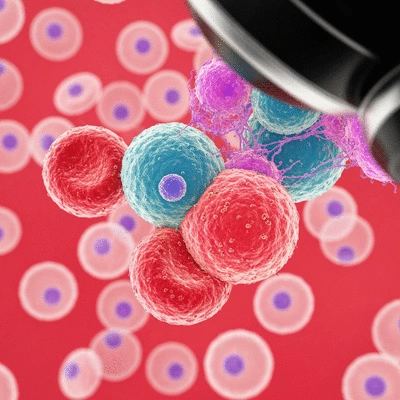Impact on Immune Cells
Decreased Neutrophil Production
Impaired Lymphocyte Function
Increased Opportunistic Infections
Did you know that leukemia can significantly weaken the immune system, making patients more susceptible to infections? Understanding this connection is vital for effective health management and proactive care.
Leukemia fundamentally weakens the body's defenses against infections by disrupting the production and function of vital immune cells. Below, we illustrate key aspects of this compromised immunity and the resulting susceptibility to various infection types.
Decreased Neutrophil Production
Impaired Lymphocyte Function
Increased Opportunistic Infections
Bacterial Infections (e.g., common bacteria)
Viral Infections (e.g., influenza, common cold)
Fungal Infections (e.g., candidiasis)
Frequent infections can often be a troubling sign for those battling leukemia. It's crucial to understand how leukemia compromises the immune system, making patients more susceptible to a variety of infections. By exploring the mechanisms behind this connection, we can better equip ourselves with knowledge and awareness.
Leukemia interferes with the production and function of immune cells, which are essential for fighting off infections. This disruption primarily occurs in the bone marrow, where blood cells, including white blood cells, are generated. Without adequate production of these cells, the body's defenses are weakened, leading to an increased risk of infections. Understanding this connection can empower patients and families to recognize the signs and take proactive steps toward health.
Leukemia affects the immune system by altering the production of white blood cells, particularly neutrophils and lymphocytes. Neutrophils are the body's first line of defense against infections, while lymphocytes play a critical role in identifying and destroying pathogens. When leukemia progresses, the bone marrow often produces fewer of these vital cells. This leaves individuals vulnerable to infections that a healthy immune system could typically fend off.
The result is a cycle where chemotherapy and the disease itself contribute to a compromised immune response, further increasing susceptibility to infections. Awareness of this connection is vital for patients, as it can guide discussions with healthcare providers about preventive measures. Researchers are continuously working to reduce infection risks in patients undergoing treatment for blood cancers like CLL and NHL, with promising findings indicating reduced infections seen in patients undergoing immunoglobulin testing.
Leukemia patients face a heightened risk of various infections, which can be categorized into bacterial, viral, and fungal infections. Each type presents its unique challenges, primarily due to the weakened state of the immune system. Neutropenia, a condition commonly associated with leukemia, significantly increases the likelihood of these infections. For example, a study highlighted the prevalence of bloodstream infections in acute leukemia patients, underscoring the severity of these complications.
Understanding these infection types not only helps in recognizing symptoms early but also underscores the importance of monitoring health closely. If you or a loved one is navigating leukemia, recognizing the signs of these infections can make a significant difference in managing your health effectively.
The bone marrow plays a pivotal role in producing white blood cells, which are crucial for a robust immune response. In leukemia patients, the health of the bone marrow is often compromised, leading to a reduction in essential cells like neutrophils and lymphocytes. This decrease directly correlates to an increased risk of infections.
When the bone marrow cannot produce enough healthy white blood cells, patients may experience more frequent and severe infections. This highlights the need for ongoing monitoring and support during treatment. Strategies to support bone marrow health may include nutritional guidance, regular check-ups, and prompt treatment of any emerging infections. Clinical trials, such as those listed on Cancer.gov, are continuously exploring new ways to manage acute myeloid leukemia and its impact on blood counts.
By understanding the vital role of bone marrow, we can appreciate the importance of maintaining its health through focused care and communication with healthcare professionals.
Leukemia weakens the immune system by disrupting the production and function of essential white blood cells, such as neutrophils and lymphocytes, which are crucial for fighting off infections.
Leukemia patients are susceptible to bacterial, viral (e.g., influenza, common cold), and fungal infections (e.g., candidiasis) due to their compromised immune response.
Neutropenia is a condition characterized by a low count of neutrophils, a type of white blood cell. It is commonly associated with leukemia and significantly increases a patient's risk of developing severe infections.
The bone marrow is responsible for producing healthy white blood cells. In leukemia, bone marrow function is often impaired, leading to a reduced number of these protective cells and a higher risk of infection.
Proactive steps include regular check-ups, monitoring symptoms closely, educating oneself about potential complications, and maintaining open communication with healthcare providers. Timely intervention for any emerging infections is also crucial.
Have you or a loved one experienced frequent infections while managing leukemia? Share your thoughts and experiences below:
In summary, understanding how leukemia affects the immune system is crucial for managing associated risks. As we've discussed, leukemia compromises the production and function of immune cells, leaving patients vulnerable to frequent infections. Recognizing the connection between leukemia and recurrent infections can empower patients and their families to take proactive measures.
It's important to stay informed about the types of infections that are common among leukemia patients. With this knowledge, patients can better recognize symptoms and seek help when necessary. By understanding the role of neutropenia and the impact of treatment on immune function, we can create effective strategies to minimize infection risk.
These points highlight the importance of vigilance and ongoing education for anyone navigating a leukemia diagnosis. Ensuring a clear understanding of these risks can lead to better health outcomes and a more informed journey toward managing leukemia effectively.
As we conclude, I encourage you to take an active role in your health journey. Monitoring symptoms and staying attuned to your body can be empowering steps in managing leukemia and its complications. Don’t hesitate to seek medical advice if you notice any recurrent infections or changes in your health.
Regular check-ups are vital. They allow you and your healthcare team to discuss any concerns, adjust treatment plans if necessary, and stay on top of your health. I also recommend that you educate yourself about leukemia and infection management—knowledge is a powerful tool in this journey!
Being proactive is key to navigating the complexities of leukemia and maintaining your overall well-being. Remember, at What Is Leukemia, we’re here to support you with resources and information to guide you through this journey.
Here is a quick recap of the important points discussed in the article:



 Understanding leukemia can feel overwhelming, but breaking it down into manageable pieces can make t
Understanding leukemia can feel overwhelming, but breaking it down into manageable pieces can make t
 Receiving a leukemia diagnosis is often a daunting experience shrouded in uncertainty. The journey c
Receiving a leukemia diagnosis is often a daunting experience shrouded in uncertainty. The journey c
 Being informed about leukemia symptoms can empower you to take proactive steps toward your health. R
Being informed about leukemia symptoms can empower you to take proactive steps toward your health. R
 As we delve into the complexities of living with leukemia, it's crucial to recognize that this journ
As we delve into the complexities of living with leukemia, it's crucial to recognize that this journ